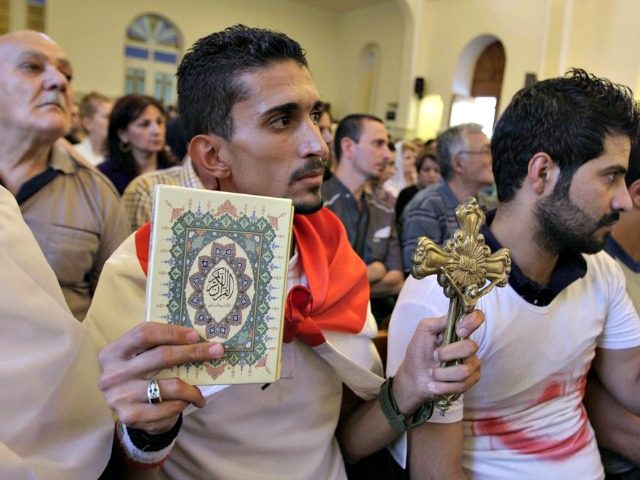Christian persecution in Iraq and Syria has decreased dramatically in the aftermath of the fall of the Islamic State, a report published Wednesday revealed, in large part because the affected areas have been almost completely stripped of their Christian populations.
Aid to the Church in Need, a papal charity of the Catholic Church that supports persecuted Christians globally and publishes studies on the state of the global Christian community, revealed that as much as 99 percent of the Christian population of Mosul has disappeared in less than two decades, and Iraq lost over 90 percent of its Christian population nationwide.
Mosul served as the regional “capital” of the Islamic State during its reign of terror in that country and Syria. The capital of the entire “caliphate” was located in Raqqa, Syria, and liberated last year by the largely Kurdish Syrian Democratic Forces (SDF) and the United States.
In Syria, cites of great biblical importance like Aleppo have lost as much as 80 percent of their Christian population, Aid to the Church in Need revealed.
The group’s findings are documented in Persecuted and Forgotten?, a report covering the years 2017-2019.
“During the period under review, Islamist violence steeply declined in Iraq and Syria – with some signs of improvement in Egypt, too,” the report explained. “An Aid to the Church in Need trip to Syria in February 2019 revealed that in many parts of the country extreme poverty had supplanted persecution as the main problem facing Christians.”
Aid to the Church in Need chose to highlight Iraq over Syria – the first time since Syria was not chosen as a profile country, because “persecution against Christians has declined is the military defeat of Daesh (ISIS), declared in 2017.” The report hesitated to celebrate the decline, however, noting that the absence of Christians is as much to credit for that decline as the absence of the Islamic State.
That drop in Christian population in the heart of the ancient Christian world began long before the Islamic State committed its genocide against the Christians of Iraq, but appears to have peaked in acceleration under the “caliphate”:
Christians had numbered 1.5 million before 2003 and yet by summer 2019, Christians in Iraq were “well below” 150,000 and perhaps even “below 120,000.” This means that, within a generation, Iraq’s Christian population has shrunk by more than 90 percent.
Father Amanuel Kloo, the last priest in Mosul, told the charity organization that 40 Christians remain in the city, a 99-percent drop in the thousands-strong Christian population of the city 16 years ago. The Islamic State lost control of Mosul in July 2017.
“The impact of this genocide – continuing migration, security crises, extreme poverty, and slow recovery – means that it may now be too late for some Middle East Christian communities to recover,” the report predicted. “In some towns and cities, the countdown to Christianity’s disappearance is ticking ever louder.”
Christians appear increasingly reluctant to return to Iraq or Syria even as the Islamic State increasingly ebbs as a threat to anyone in the region. This the report attributes to the rise of a “caliphate mentality” that remains in the region even in the absence of actual Islamic State jihadists.
Many Christians feel persecuted by the Iran-backed militias in Iraq that have overrun areas like Kirkuk, formerly under Kurdish control, in the aftermath of the ISIS invasion. The few who remain have no money to rebuild, and most, in some communities, are elderly who do not have the ability to leave.
“In large parts of the country, many months on from the fall of Daesh, there is little sign of refugee Christians returning to Iraq; indeed, families continued to leave,” the report found.
The only glimmer of hope detailed in the report for a sustained Christian presence in the cradle of the faith is in the Kurdistan Regional Government (KRG), centered in Erbil. Erbil has taken in thousands of refugees, including Christians, and Aid to the Church in Need notes it has been able to perform its charity work in the city.
“[I]f security can be guaranteed there is every indication that Christianity could survive in Nineveh and Erbil,” the report concluded.
Erbil is currently facing a wave of Kurdish refugees from Syria, where the Turkish government, backed by the largely Arab Free Syrian Army, launched an invasion to eradicate the Kurdish People’s Protection Units (YPG/YPJ) this month. Ankara claims to have accepted a “permanent” ceasefire with the Kurdish forces so long as the Kurds evacuate Syrian Kurdistan, or Rojava. The government of Russia has agreed to leave troops in key cities like Kobani, which the YPG managed to keep the Islamic State out of in a weeks-long battle.
Prior to the Turkish invasion, Kobani had become a haven for former Muslims embracing Christianity in the aftermath of the ISIS genocide.
Some Christian leaders have condemned Turkey for destabilizing Rojava, leaving Christians vulnerable. In years past, however, Christian groups have accused the YPG of antagonizing and persecuting Christian civilians in their quest to establish a Kurdish state.
Follow Frances Martel on Facebook and Twitter.

COMMENTS
Please let us know if you're having issues with commenting.